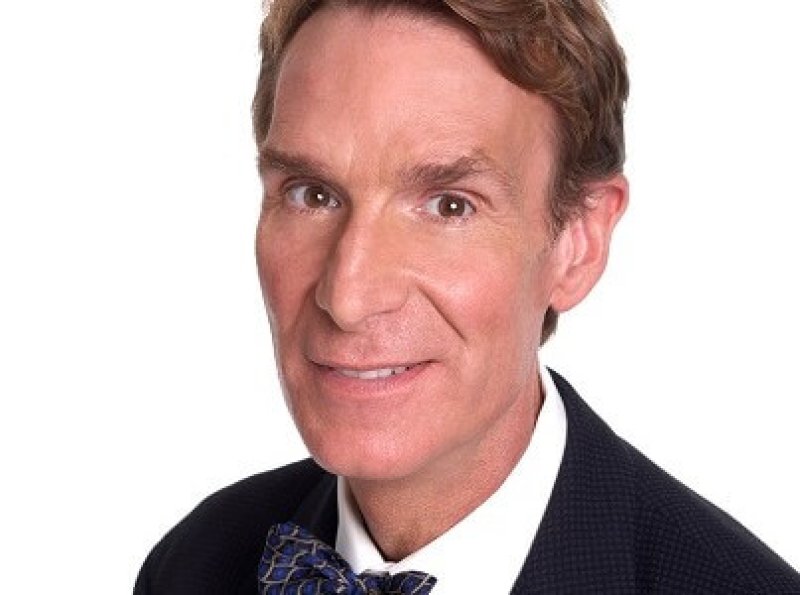UPDATE, March 4 11:10 P.M. — After reading some of the comments, I’ve decided to make an adjustment to this post. Originally, it was a relatively straight re-blog of a Physics Police post accusing Bill Nye of an anti-GMO slant in episode of his Eyes of Nye series. Upon a careful review of the episode in question, I’ve amended the text.
We all love Bill Nye. For my generation growing up, he was the Science Guy: a font of fascinating information, engaging demonstrations, and a constant reminder to try things for yourself. His fame has wavered since then, but he got a boost to his public profile by debating creationist Ken Ham in February of this year.
This is the Nye we love, champion of science, vigorously and rigorously defending the central tenet of modern biology:
But a blog post from Physics Police brings up another video of Nye which may trouble people who see themselves as allies of science in the debate over GMOs. Nye devoted an entire episode of his 2005 series “Eye of Nye” to the subject of crop biotechnology, but Phyiscs Police claims it had a distinctively anti-science slant:
Physics Police points out troublesome moments, complete with linked time-stamps:
-
If we genetically modify out food, say by taking a gene from a fish, and putting it into the tomato, we’re creating a whole new species. [3:00]
-
Critics charge: the nutritional value of Golden Rice is less than 10% of the daily Vitamin A requirement. [10:25]
-
Teacher: Yes, children, but who underwrites the science, though?Student: Missus Incorporated, makers of genetically engineered food. Teacher: Yes, so they’ve really got us by the shorts on this one. [18:25]
So we have Nye overstating the nature of genetic modification (a gene from a fish in a tomato just makes a tomato with a fish gene, not a tomato-fish, and it would not be new species), and buying into the same big money conspiracy theory promoted by many anti-GMO activists. (Note: it’s not that you shouldn’t “follow the money” or monitor big corporations like Monsanto, it’s just that the science guiding GMO regulation is demonstrably not a trillion-dollar scam.)
However, in each case, Nye almost always presents a “pro-GMO” argument from a scientist in close proximity. The one thing he consistently says, himself, that I find troubling is overstating genetic modification as the “creation of a new species”.
Physics Police was troubled by the tone: “In one sketch, a television host interviews a corporate representative, who explains how a fish gene is used to keep tomatoes from freezing. The host responds by asking: But, isn’t that kind of creepy?“
The sketch in question ends with a guy in a corn suit attacking a Monstano proxy. Silly, yes, and definitely playing in to corporate stereotypes but about on par with Stephen Colbert’s recent GMO wheat sketch — and Colbert also has an awful lot of scientists, authors, and professors on his show for a late-night satire.
It’s easy, especially in this all-too-strident debate over GMOs, to take an us-versus-them mentality. But before you go and burn all your VHS recordings of Bill Nye the Science Guy episodes, consider that in 2005, when this episode aired, many people unfamiliar with the science of GMOs were saying similar things. In 2005, Mark Lynas had not undergone his now-famous “conversion” from anti-GMO activist to GMO defender.
To me, this video doesn’t reveal that Nye has failed some “GMO ally” test, as the tone of the Physics Police post implies. Most of the questions and fears he raises are the questions and fears of 2005 and, to a disappointing extent, the same fears we need to address today. He doesn’t come down on either side, and his “conclusions” are that he is pro-labeling and pro-careful study. (If the labeling thing rankles: an entire segment talks about the difficulty of labeling and gives voice to scientists who feel it would be unnecessary.) But there is a difference between not being a crusader in defense of GMOs and being anti-GMO; the GLP is here to deepen this debate, not make it more histrionic.
Kenrick Vezina is Gene-ius Editor for the Genetic Literacy Project and a freelance science writer, educator, and amateur naturalist based in the Greater Boston area.































